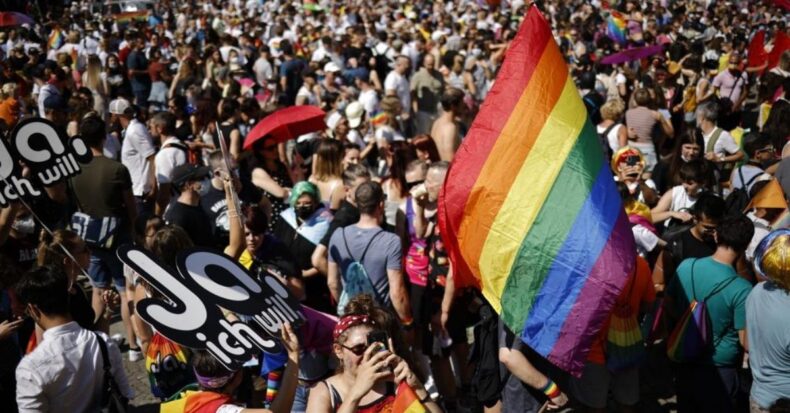When it comes to LGBT+ rights, Switzerland is not as progressive as its neighbouring countries. Nevertheless, it has come a long way, and it has resulted that now legalization of same-sex marriage is in the process.
On 18 December 2020, seven years after the Green Liberal Party of Switzerland introduced a bill providing for same-sex marriage, the Swiss federal legislature adopted corresponding legislation (which also provides for IVF access for lesbian couples).
This followed the parliamentary amendment to the Swiss Civil Code to change the definition of marriage from “a union between a bride and a groom” to a “union between two people”.
This accomplished an essential victory for same-sex couples in the country, especially as it came several years after most other western European states had already passed the law.
But it also faces enormous consequences that, in April 2021, opponents of gay marriage even gathered enough signatures to force a binding referendum on the matter.
The Protest
On September 4, 2021, the citizens of the country gathered to protest for the legalization of same-sex marriage in the Alpine country.
Swiss Lawmakers had voted to legalize marriage for LGBTQ+ couples. But due to a massive number of signatures raise against the legalization, they took the matter to a national referendum. This group of politicians had called for the referendum to ‘protect traditions’
According to SRF Public broadcaster, around 20,000 people took part in the rallies, including 70 LGBTQ+ organizations from around the country.
The slogan of the protestors was, “You can do it. Marriage for everyone now.” The organizers of the Pride March saw an avalanche of support in the Zurich march.
So far, same-sex couples in Switzerland are only able to get official approval for civil unions, which are not considered as equal footing as marriages by any means.
If the law receives votes in a majority for the legalization of same-sex marriage, this would also allow couples to adopt children in Switzerland.
In addition, it will be easier for the same-sex couple to access sperm donations if they wanted to start a family, and it would be easier for the couple to get Swiss citizenship for those who have foreign partners.
The Amendment
The history of gay marriage in Switzerland is relatively new. The country is considered to be one of the safest in the world for the LGBT+ community. It also guarantees some fundamental rights to its LGBT+ citizens.
The new bill, which has been passed now, includes a written statement that allows gay and lesbian couples to tie the knot.
This has been the result of multiple rounds of debate since 2013. It was finally said to be succeeded after a vote of 136 to 48 with nine abstentions in the National Council (lower house) plus 24 to 11 with seven abstentions in the Council of States (upper house).
This also extends the role of parent to the woman not carrying the child. In many European countries like Germany, Austria, France and the Netherlands, the law follows the recognition of LGBTQ+ marriage.
As it is part of the EU, Switzerland marriages are therefore valid in these countries, too. The people who are opposing the legalization of gay marriages believe that marriage should only be reserved for a man and a woman together and that children should have the right to have both a traditional father and a mother.
Many countries have been slammed by the EU for going in the opposite direction, like Hungary and Poland.
According to a poll by Swiss gay rights group Pink Cross, 82% of the Swiss population supports same-sex marriage.
Many people will believe that now it is high time to stop the hate against the LGBTQ+ Community and provide them fundamental human rights to have a family of their own.













